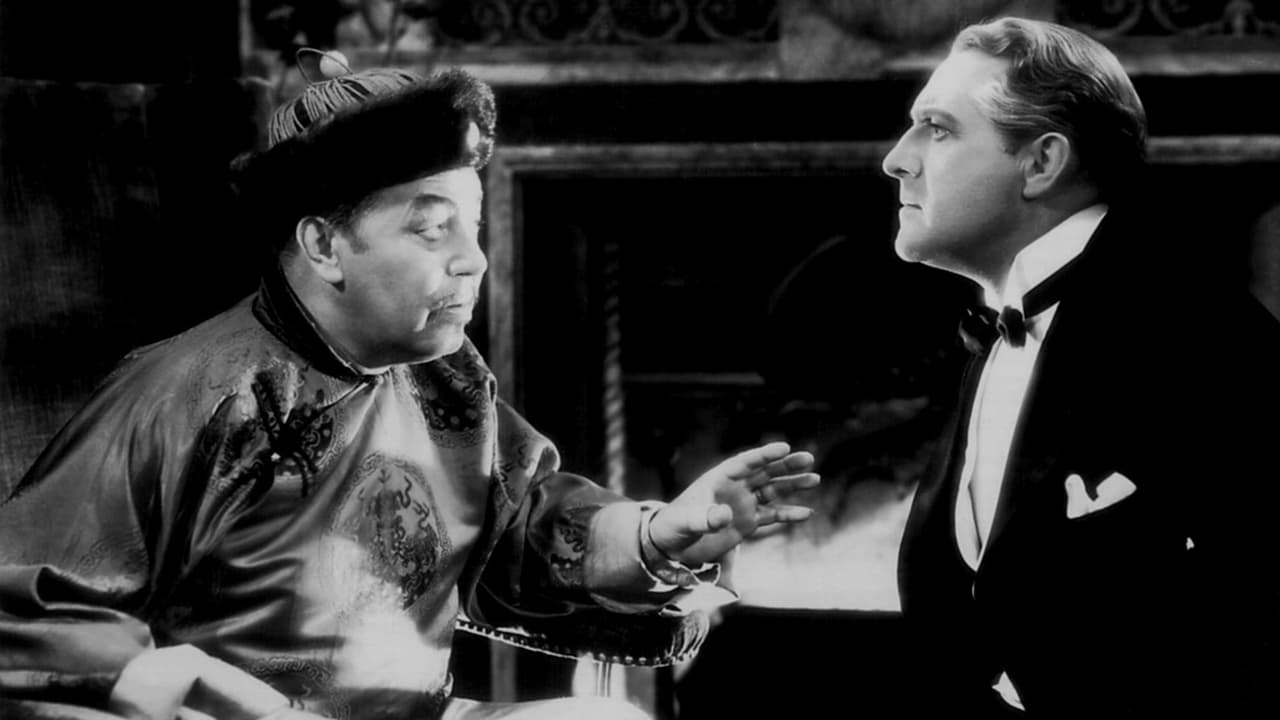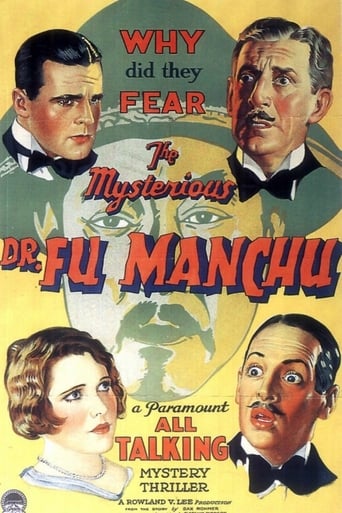


A Rowland V. Lee production for Paramount Famous Lasky. Presented by Adolph Zukor and Jesse L. Lasky. U.S. release: 10 August 1929. New York opening at the Rialto: 27 July 1929. Length: 7,663 feet. 85 minutes.NOTES: First of the "Fu Manchu" features, this was appropriately adapted from the premier novel in the series in which the hitherto friendly Fu vows revenge on the white devils who accidentally kill his wife in the Boxer Rebellion. It was followed by two Paramount sequels, The Return of Dr Fu Manchu (1930) and Daughter of the Dragon (1931). Metro-Goldwyn-Mayer then took the series over with The Mask of Fu Manchu (1932) in which Warner Oland was replaced by Boris Karloff, and at this point the studio lost interest. Republic revived the character in 1940 with Henry Brandon playing the role in the serial Drums of Fu Manchu. In 1965, Christopher Lee took on The Face of Fu Manchu, followed by The Bride of Fu Manchu, The Vengeance of Fu Manchu, Kiss and Kill, and finally in 1967 The Castle of Fu Manchu. COMMENT: Aside from its distractingly noisy soundtrack, this Fu Manchu is not the creaky curiosity that some critics claim. True, some scenes are statically presented much in the manner of a photographed stage play, but these are counterbalanced by more cinematic sequences of action and spectacle. True, also that "comedian" William Austin (one of the drawbacks of Clarence Badger's 1927 It) is even more painful when he augments his eye-rolling with his prissy voice, but fortunately he is not in the movie all that much. Warner Oland majestically holds center stage, whilst O.P. Heggie and Neil Hamilton provide worthy opponents. Although often unattractively photographed, made up and costumed, Jean Arthur makes an appealing heroine. All in all, this Fu Manchu still has enough zing to frighten all but the most blasé movie fans. Oddly enough, the movie's original advertising poster emphasizes "ALL TALKING" rather than any members of the cast, although four of them illustrated: Neil Hamilton, Claude King, Jean Arthur (a flattering impression-she doesn't look a bit like this in the actual movie), and William Austin. But not Warner Oland!AVAILABLE on DVD through Sinister Cinema. Quality rating: seven out of ten.
... View MoreThere is a definite anti-Asian sentiment in this sometimes unintentionally funny pre-code thriller that not only slams Chinese, but effeminate men as well. A slight attempt to give Warner Oland's character a justifiable motive (at least in his mind) for murder. He blames the Caucasian men who slaughtered his family during the Boxer Rebellion, and sets his American ward Jean Arthur up to destroy the families of his enemies. Of course, she has the gall to fall in love with one of them, a very young Neil Hamilton. Desperate causes require desperate measures, and Fu Manchu sets up a vile torture to keep Arthur in line.Subtle at first, this turns out to be almost as offensive as the 1932 Boris Karloff cult classic. Oland would go on to play the heroic Charlie Chan in a series of B mysteries but here he is the epitome of pure evil. Melodrama!, he screeches in one particularly odd moment, just before sharing his evil goals with the doomed lovers. An effeminate butler adds on unfunny stereotypes as he claims he doesn't wear glasses because it would make him look effeminate, and later cries about not living to the next day to have marmalade one last time. Arthur, in one of her early talkies, comes off a far cry from her later skilled actress and is almost embarrassing to watch. Creaky to watch, offensive to listen to, and eye-rolling in every other element, yet such a curiosity of bad taste.
... View More...and you'll feel like watching this film was time well spent. Perhaps it was the job Warner Oland did here as Fu Manchu that got him the role of Charlie Chan over at Fox, because he is sensational in the part. He transitions from humanitarian to a one-man killing machine on a quest for vengeance against those he holds responsible for the death of his wife and only child. Their deaths occur in 1900 during the Boxer Rebellion when a troop of soldiers fire on Fu Manchu's house. The Europeans are after the boxers, and Fu Manchu's family is just collateral damage to them. At the time of the rebellion, Fu Manchu has a young two year old European female ward (Jean Arthur). He uses the power of hypnotism he holds over her to get her to help in his dirty work without her ever remembering anything that happened.Twenty years later Fu Manchu has killed off all those he finds responsible except one man and his offspring, and this leads him to England. A detective from Scotland Yard figures out what is going on, and the surviving family members including Fu's ward are holed up in an old dark house trying to get the Chinese mastermind to show himself. The complicating factor is that one of Fu Manchu's targets (Neil Hamilton) and Fu Manchu's ward (Jean Arthur) have fallen in love.This film is pretty static, but then it is one of the first talking films and the placement of the microphone and camera demanded this. Oland and Hamilton are great in their roles, and everybody else is OK except Jean Arthur. She is really playing this one over the top, like she thinks she is still in a silent picture and expecting the villain to tie her to a railroad track at any instance. She doesn't give a glimpse of the great performances that are to come.Watch this one for Warner Oland, for the atmosphere, and for the general touch of class you find in all of the early Paramount talkies.
... View MoreFirst of the sound Fu Manchu films stars Warner Oland as the "evil" doctor. Here the plot begins in 1900 during the Boxer Rebellion. Fu is a good and loving doctor respected by all sides of the conflict. When the Boxers are routed by a western army several take refuge in Fu's garden. The soldiers pursue and in the resulting fighting the wife and child of the doctor are slain. He of course vows revenge and sets out to kill the men he feels are responsible. The film jumps ahead to the present (1929) where Fu, aided unwittingly by his Caucasian ward,a young Jean Arthur, stalks London on his path of revenge.Opulent and spectacular early sound film that mostly doesn't seem like most sound films of the period, its not static and frozen, there is movement around the sets. If there is any hint of its origin in the early days of sound its the lack of music cues. Otherwise this is a rip roaring thriller. It has more in common with the murder mysteries of the period rather then the much better known later versions of Sax Rohmer tales with Boris Karloff or Christopher Lee. Here we have shadowy streets in Chinatown and an English manner house perched high on a cliff. Its moody fun stuff.The cast is mostly excellent, with Warner Oland playing Fu as a darker version of his most famous role, Charlie Chan. The real hero here is not so much Nayland Smith, rather it Dr Petrie, son of of one of Fu's Targets. Petrie is played by Neil Hamilton, best known now as Commissioner Gordon on Batman, however this was back at the start of his career when he was an action leading man. It clear why he was a popular actor back in the day. The only weakness is Jean Arthur as Fu's ward. She seems ill at ease and actually quite awkward. One would be hard pressed to realize that she had been on screen in almost 50 movies by the time this film was made. I would like to think its because of the transition to sound, certainly she shows little sign of the wonderful performances she would give in films like You can't Take it With You or Mr Smith Goes to Washington.Over all this is a perfect film for a dark and stormy night.
... View More